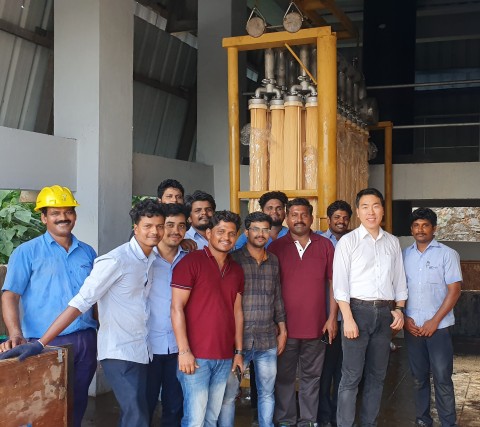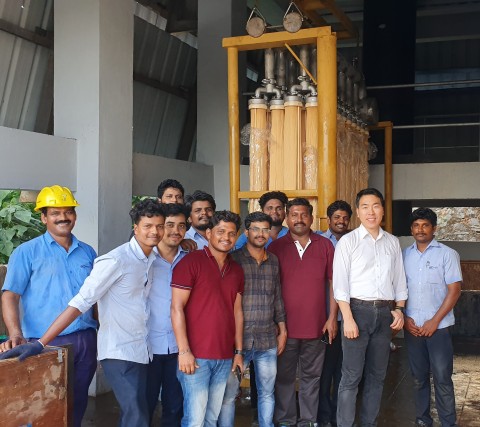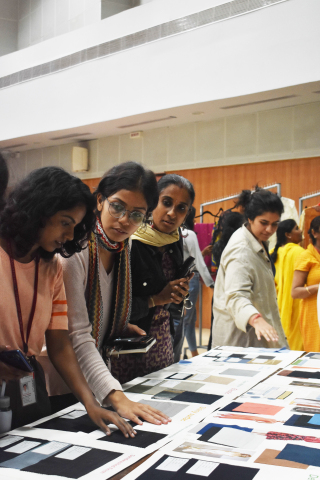TOKYO--(BUSINESS WIRE)--Asahi Kasei renewed its membership in the Business Call to Action (BCtA) led by the United Nations Development Programme (UNDP) in February 2021 with businesses in India for Bemberg™ regenerated cellulose fiber (cupro) and Microza™ polyvinylidene fluoride (PVDF) hollow-fiber membrane.
Since joining BCtA in 2016, Asahi Kasei’s support for stakeholders in the Bemberg™ value chain in India from raw material to garment as well as our collaboration with academia have been highly evaluated as a business model combining commercial activities and sustainable development.
While continuing to create new employment opportunities in the textile industry in India and to foster young talent that will lead the next generation of India’s fashion industry, we are additionally advancing plans to install industrial wastewater treatment systems which are essential for the environmentally friendly sustainable development of the textile industry.
Bemberg™ is the brand name of a regenerated cellulose fiber made from cotton linter, the fuzz around cotton seeds. It is widely used for the lining of high-quality suits as well as many other applications such as outerwear, innerwear, bedding, and sportswear.
Microza™ is a hollow-fiber membrane for filtration systems used in a wide range of fields spanning from chemicals and high-precision electronics to potable water, wastewater, foods, pharmaceuticals, power plants, and environmental protection. It is highly appraised by customers based on an established track record of performance.
Outline of Bemberg™ business in India
This is the 45th year since Bemberg™ yarn was first exported to India in 1976. Traditional garments worn by many women are made of Bemberg™ in India. With export volumes growing to over 4,000 tons per year, India is currently at the heart of the Bemberg™ business.
Through direct and indirect involvement in the Bemberg™ value chain in India from raw material to garment, Asahi Kasei contributes to the development of techniques and the growth of human resources in India including the enhancement of skills, the securement of stable incomes, and the creation of new employment opportunities. Asahi Kasei procures from India a great amount of the cotton linter used for the production of Bemberg™ yarn. To support local manufacturers, Asahi Kasei lends equipment to remove linter from cotton seeds free of charge, and has our own engineers provide the local workers with training and technical instructions for improving productivity. Cotton linter imported to Japan is processed into Bemberg™ yarn, which is exported to India and sold to weavers. Asahi Kasei also provides ongoing technical guidance on weaving and dyeing in the fabric production process in India.
Asahi Kasei also focuses efforts on the education of young people and students who will lead the next generation of India’s textile and fashion industry, and contributes to human resource development by supporting the enhancement of skills at several Indian universities.
New endeavor with Microza™ in India
In addition to the above, Asahi Kasei also proposes that customers install Microza™ systems to treat wastewater from fabric dyeing, aiming for zero wastewater emission from dyeing plants, in order to protect the environment surrounding the plants and to conserve valuable natural water resources by recycling the water which is used.
More information regarding Asahi Kasei’s BCtA activities is available on the following website: https://www.asahi-kasei.co.jp/fibers/en/bemberg/sustainability/sdgs.html
United Nations Development Programme (UNDP):
UNDP was founded in 1966 as one of the UN’s subsidiary bodies under the UN General Assembly and the UN Economic and Social Council. Headquartered in New York, UNDP provides development assistance in nearly 170 countries with focuses on sustainable development; democratic governance and peacebuilding; and climate and disaster resilience.
Business Call to Action (BCtA):
BCtA is a unique multilateral alliance led by six development agencies and governments, including the UNDP. Launched in 2008, BCtA aims to accelerate progress towards the Sustainable Development Goals (SDGs) by challenging companies to develop inclusive business models that engage people at the base of the economic pyramid.






